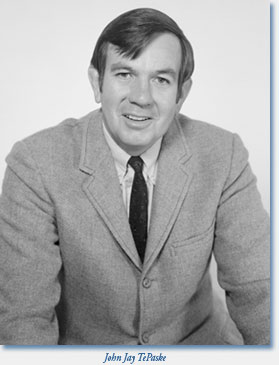 Historian of colonial Latin America; former vice president of the AHA's Professional Division
Historian of colonial Latin America; former vice president of the AHA's Professional Division
John Jay TePaske (1929–2007), a leading scholar of colonial Latin America, died in Durham, North Carolina, on December 1, 2007. He was 77 and had retired in 1998 after a long and distinguished teaching career at Memphis State University (1958–59), Ohio State University (1959–67), and Duke University (1967–98). TePaske was a much admired graduate mentor and undergraduate teacher, who was also utterly dedicated to his scholarship and to serving the wider profession. He lived a full, productive, and happy life, and his memorial service on January 12, 2008, at Goodson Chapel at Duke University was attended by more than 200 people—family, friends, colleagues, and former graduate and undergraduate students. John TePaske is survived by his wife Neomi, his daughters Susan TePaske-King and Mariana TePaske-Daly, three grandchildren, and his brother Robert.
TePaske was born in Grand Rapids, Michigan, on December 8, 1929, the son of Leo TePaske and Leona Kloote-TePaske. His grandparents had emigrated from the Netherlands. TePaske attended Michigan State University, where he began studying engineering, but he later switched to the history of Latin America after taking a course with Harold Fields. After graduation he married Neomi Gray, who would be his close companion for the remainder of his life. They then moved to Durham, North Carolina, where TePaske studied Latin American history at Duke University with John Tate Lanning. Neomi contributed to his education by teaching second grade, and she remained involved in education as a teacher and later as a child counselor until her own retirement. TePaske earned his MA in 1953 at Duke, and then served two years in the army during the Korean War. He returned to graduate school in 1955 and received his PhD in 1959, also from Duke University, where he would later return to replace his own graduate mentor in 1967.
TePaske's long scholarly career extended nearly 50 years, and he produced 15 books and a prodigious number of articles and book chapters. Throughout his career, TePaske was a tireless, enthusiastic archival scholar. His visits practically every year to his favorite repository, the Archivo General de Indias in Seville, Spain, continued until 2005 (when he was nearly 76 years old)! To his doctoral students at Ohio State and Duke, TePaske taught the virtues of a meticulous attention to detail, an enthusiasm for archival research, the importance of publishing their work in clear, forceful prose, and the value of working together in the academic enterprise. He was also a pioneer in the use of quantitative methods, which he employed to analyze seldom-utilized data, particularly colonial treasury accounts, to make bold insights into the political, economic, and social history of Spanish America.
It was this passion for archival research and scholarly collaboration that prompted John TePaske and Herbert S. Klein to organize a team of researchers to compile all the extant accounts of the Spanish American treasures for the entire colonial period. This project led to the publication of six volumes of colonial accounts, which TePaske, Klein, and a generation of scholars have used to make new insights into history of the Spanish American Empire. In fact, until his death TePaske was working every day on a book on gold and silver production in Spanish America and Brazil, analyzing its impact from a global perspective. Given his impressive scholarly output, it is no small wonder that his research received support from the Ford Foundation (1962–63), the Tinker Foundation (1975–77), the National Endowment for the Humanities (1976), the Social Science Research Council (1986), the Bank of Spain (1986), the National Humanities Center (1989–90), the John Simon Guggenheim Foundation (1995), and an Andrew W. Mellon Foundation Emeritus Fellowship (2005). TePaske was particularly proud of this last award to finish his work on bullion production, which came to him in his "dotage," as he liked to say. Although he did not live to complete this last important project, TePaske's former student Kendall W. Brown is finishing the last stages of the book-length study.
John TePaske was always a demanding but compassionate teacher, and a paragon of responsible leadership in the profession. He won the Distinguished Teaching Award at Duke in 1969, and he took great pride in the accomplishments of his graduate students and undergraduates both at Ohio State and Duke universities. TePaske also believed strongly in professional service, having worked as chair of the Conference on Latin American History (1980–81), as vice president of the American Historical Association's Professional Division (1986–89), and on numerous editorial boards of leading journals in the United States and Spain. Despite these accomplishments in teaching and service, TePaske was even more renowned in the profession for his support of younger scholars. A whole generation of Latin American historians turned to him for professional advice and support, and he is remembered fondly for writing letters of recommendation for colleagues seeking grants, academic positions, and promotion and tenure. Once he casually remarked in my presence that he had written for over 14 different colleagues over the course of that particular year. Colleagues and former students remember his generosity, his keen sense of humor, his intellectual curiosity, and his sincere interest in all aspects of the academic enterprise.
Quite apart from his academic interests, John TePaske was also a passionate sports fan, and he and Neomi attended every home basketball game in Cameron Indoor Stadium, where their beloved Blue Devils played. He also enjoyed tennis and fly fishing at his summer home in Crystal Lake, Michigan. Those who remembered John at his memorial service this past January spoke about a man who lived a full, happy, and productive life. John's was a life truly well lived.
—Kenneth J. Andrien
Ohio State University
Tags: In Memoriam Latin America North America
Comment
Please read our commenting and letters policy before submitting.






